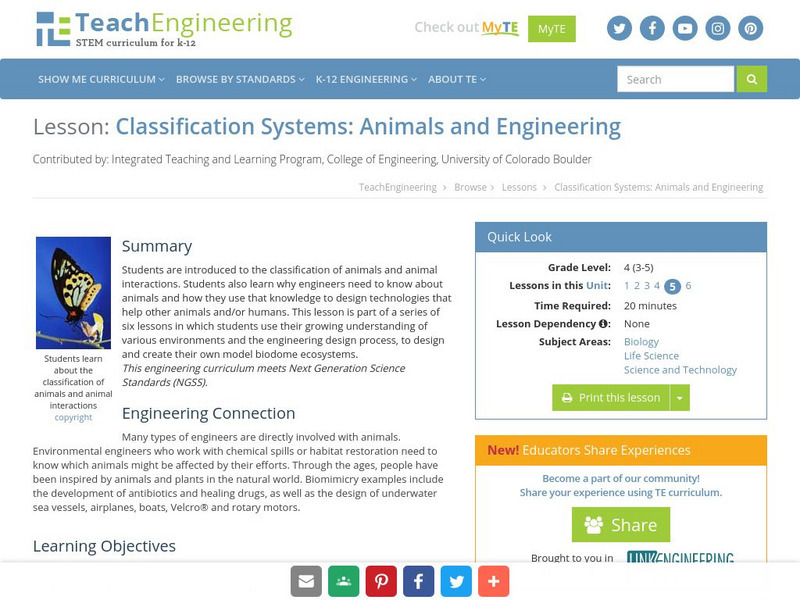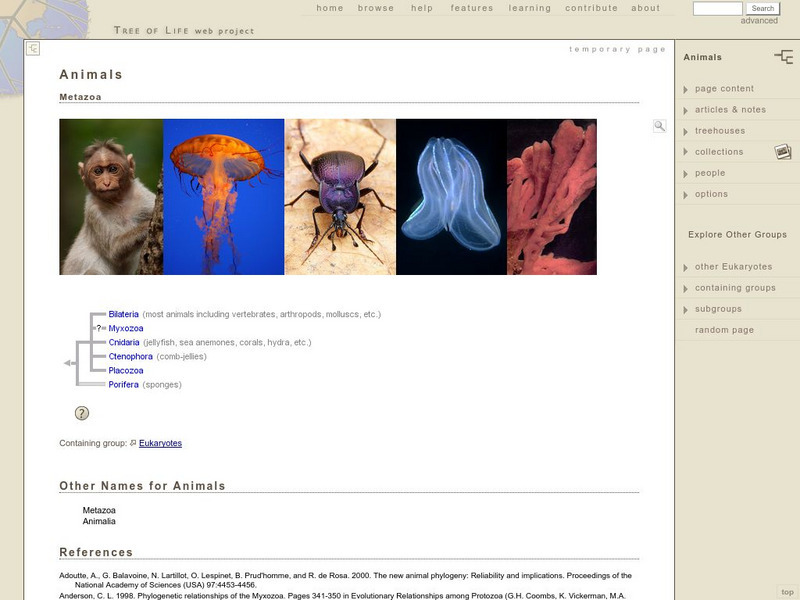Curated OER
Animal Playing Cards
Students research animal characteristics including information about mammals, reptiles, birds, and fish. They place the information into a database and then, create playing cards using the information.
Curated OER
Sharkland Wiki
Students, while researching the waters around southern Africa and viewing a video of the episode "Sharkland" from Thirteen's series NATURE, critique reliability of online resources and analyze the various components of a wiki. They...
ArtsNow
Arts Now Learning: Classification of Animals: "Connect Your Animal Show" [Pdf]
Fifth graders learn about animal classification by reviewing the taxonomy system, then looking at pictures of animals as if they were scientists, acting out an animal's characteristics, then classifying their animal.
Smithsonian Institution
Smithsonian National Zoo: Classification Systems
A great overview of the science of classification. Topics addressed include summaries of the five kingdoms, the seven taxa, the definition of a species and the classification of the panda.
Other
It's All About What's Inside. Classification and the Tree of Life [Pdf]
In this science lesson, students look at how animals have traditionally been classified in a tree of life diagram by examining the characteristics of plastic eggs. They then analyze the genetic code assigned for each egg and look for...
Tree of Life Project
The Tree of Life Web Project
The Tree of Life is a multi-authored, Internet distributed project containing information about phylogeny and biodiversity. The Tree of Life can be used to locate information about a particular group of organisms through their taxonomy.
BiologyWise
Biology Wise: Classification of Animals
The classification system for animals is explained and examples given. Includes suggestions for how to teach the system to younger students and how to create a classification chart of the animal kingdom.
TeachEngineering
Teach Engineering: Animals and Engineering
Young scholars are introduced to the classification of animals and animal interactions. Students also learn why engineers need to know about animals and how they use that knowledge to design technologies that help other animals and/or...
Biology Corner
Biology Corner: Taxonomy Project
A teacher lesson plan that allows students to pretend to be an alien taxonomist working with fictitious animals to create their scientific name, classification chart, design a dichotomous key, and create a food web.
Tree of Life Project
The Tree of Life Web Project: Animals
Extensive site that contains much information about the various animal phyla. Each phyla gives photos, common examples, scientific names and references. Collection of 1630 websites about bio-diversity.
Other
Illinois Wesleyan University: Tardigrade Species Distribution Project
This was a research project on tardigrades that took place some time ago. The site contains information about the project and about tardigrades, including their taxonomy and a glossary. As this is an older site, the links to the...
Scholastic
Scholastic: Study Jams! Science: Animals: Kingdoms of Life
A playful interactive introducing biology's five animal kingdoms. Watch the video, take a quiz, and review vocabulary.
Wikimedia
Wikipedia: Arthropod
Wikipedia offers information on arthropods, the largest phylum of animals. Includes scientific classification chart and image.
Other
Illinois Wesleyan Univ.: Tardigrade Species Distribution Project: Lesson Plan
This lesson plan was for classes that participated in a research project on tardigrades that took place in 1999. Tardigrades, also known as water bears, are fascinating, tiny creatures that can survive under the most extreme conditions....
Other
Secondary Science Program: The Six Kingdoms
A short overview of the six kingdoms in our scientific classification system: Plants, Animals, Protists, Fungi, Archaebacteria, and Eubacteria.
Other
Alternative Classifications of Life
The Linnaean system (1758) classified all macroscopic living organisms as either Animals or Plants, based on whether they moved [anima, with a soul] or not. Thus, Fungi were included as plants. With the invention of the microscope and...
BBC
Bbc: Nature Wildfacts: Eastern Grey Kangaroo
BBC Wildfacts profiles the eastern kangaroo of Australia with photographs and a fact sheet.
San Diego Zoo Global
San Diego Zoo: Koalas
This resource presents detailed information about the koala, including several photos and a video clip. [0:12]
Colorado State University
Colorado State University Libraries: Garst [Wildlife] Photographic Collection
Digitized collection, searchable by name, endangered species status, habitat, or continent, of over thirteen hundred wildlife photographs taken throughout the world during the filming of Mutual of Omaha's Wild Kingdom television series....
Sea World Parks & Entertainment
Animal Bytes: African Cape Buffalo
Provides users with a concise list of information helpful to anyone wanting to know more about these South African ungulates. Contains scientific classification of these animals, fast facts, fun facts as well as additional information on...
Sea World Parks & Entertainment
Animal Bytes: African Elephant
Resource for anyone seeking information on these huge creatures. Provides scientific classification of African Elephants, fast facts, fun facts as well as additional information on ecology and conservation.
ClassFlow
Class Flow: Animal Classification
[Free Registration/Login Required] Students will classify organisms into groups and relate how they determined the groups with how and why scientists use classification. They will also demonstrate how animals are sorted into groups...
Sea World Parks & Entertainment
Sea World: Clydesdales
Outlines the characteristics of horses and the Clydesdale breed, including classification, history, behaviors, and diet. Information at a level of upper intermediate elementary but easily adaptable for all teachers.
BBC
Bbc Schools: Ks2 Bitesize: Science: The Living World
This landing page includes learning modules on the following topics of: animals, plants, microorganisms, life cycles and reproductions, food chains, habits, humans and the environment, adaptation, inheritance, and evolution.




![Arts Now Learning: Classification of Animals: "Connect Your Animal Show" [Pdf] Lesson Plan Arts Now Learning: Classification of Animals: "Connect Your Animal Show" [Pdf] Lesson Plan](https://d15y2dacu3jp90.cloudfront.net/images/attachment_defaults/resource/large/FPO-knovation.png)










![Colorado State University Libraries: Garst [Wildlife] Photographic Collection Website Colorado State University Libraries: Garst [Wildlife] Photographic Collection Website](https://content.lessonplanet.com/knovation/original/209361-4b7da185aee2c7b0cebc49579baf904c.jpg?1661495039)



